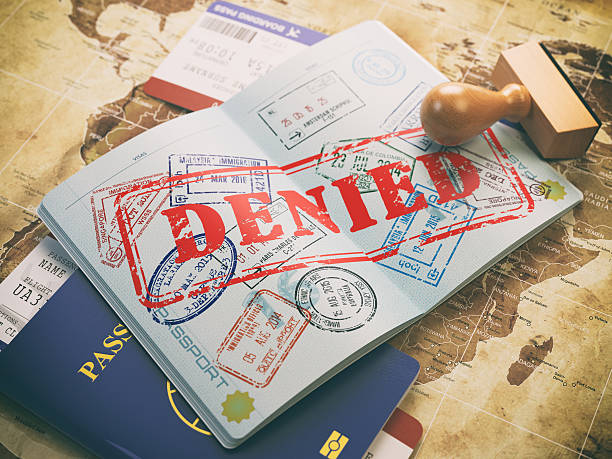A Canada study visa allows you to pursue your education at any designated learning institution (DLI) in Canada for up to six months or more, depending on the duration of your program. It also grants you some benefits, such as working part-time on or off-campus, applying for a post-graduation work permit (PGWP), and bringing your spouse or partner and dependent children with you.
However, getting a Canada study visa is not as easy as it sounds. You will have to meet certain requirements and submit a complete and accurate application to the Canadian immigration authorities. You will also have to prove that you are a genuine student who intends to study and return to your home country after completing your studies. Unfortunately, many applicants fail to do so and end up getting their Canada study visa rejected.
In this blog post, we will discuss some of the common reasons for Canada study visa rejection and how to avoid them. We will also share some tips and tricks to help you prepare a successful Canada study visa application and increase your chances of getting approved.
Common Reasons for Canada Study Visa Rejection
According to the latest statistics from the Immigration, Refugees and Citizenship Canada (IRCC), the Canada study visa refusal rate was 49% in 2023. This means that almost 4/5 out of every 10 applicants were denied a Canada study visa. The reasons for rejection may vary from case to case, but here are some of the most common ones:
Incomplete or incorrect application form
One of the most basic and avoidable reasons for Canada study visa rejection is submitting an incomplete or incorrect application form. The application form is the first and most important document that the visa officer will review, so you have to make sure that it is filled out correctly and completely.
You have to provide all the required information, such as your personal details, education history, work experience, travel history, family background, and contact information. You also have to answer all the questions honestly and consistently, without any discrepancies or contradictions. Any missing, inaccurate, or false information can lead to your application being rejected or delayed.
Insufficient or invalid documents
Another common reason for Canada study visa rejection is providing insufficient or invalid documents to support your application. You have to submit various documents to prove your eligibility and credibility as a student, such as your passport, academic transcripts, language test results, letter of acceptance, proof of financial support, medical exam, police clearance, and biometrics.
You have to make sure that these documents are valid, original, and certified, and that they match the information on your application form. You also have to follow the specific format, size, and language requirements for each document. Any missing, expired, or fake documents can result in your application being rejected or returned.
Lack of financial proof or funds
One of the most crucial and challenging reasons for Canada study visa rejection is failing to demonstrate sufficient financial proof or funds to cover your expenses in Canada. You have to show that you have enough money to pay for your tuition fees, living costs, transportation, and other expenses for yourself and your accompanying family members, if any.
You also have to show that you have a stable and legitimate source of income or funding, such as savings, scholarships, loans, sponsorships, or investments. You have to provide evidence of your financial status, such as bank statements, tax returns, pay slips, or letters of support. You have to prove that you can afford to study and live in Canada without relying on public assistance or illegal work.
Poor academic performance or credentials
Another reason for Canada study visa rejection is having poor academic performance or credentials that do not meet the standards or expectations of the Canadian education system. You have to show that you have a strong academic background and potential to pursue your chosen program of study in Canada.
You have to provide your academic transcripts, diplomas, certificates, or degrees from your previous or current studies. You also have to show that you have a clear and realistic study plan that matches your academic goals and interests. You have to prove that you are a genuine and motivated student who is serious about your education and career.
Inadequate language proficiency or test scores
Another reason for Canada study visa rejection is having inadequate language proficiency or test scores that do not meet the requirements or expectations of the Canadian immigration or education authorities. You have to show that you have a good command of either English or French, the official languages of Canada, depending on the language of instruction of your program.
You have to provide your language test results, such as IELTS, TOEFL, CELPIP, or TEF, from a recognized testing agency. You also have to show that you have a sufficient level of language skills to communicate effectively and participate actively in your academic and social activities in Canada. You have to prove that you are a competent and confident language user who can adapt to the Canadian culture and environment.
Weak or unclear study plan or purpose of visit
Another reason for Canada study visa rejection is having a weak or unclear study plan or purpose of visit that does not convince the visa officer of your intentions or motivations to study in Canada. You have to show that you have a well-defined and coherent study plan that outlines your reasons for choosing Canada as your study destination, your program of interest, your future plans, and your ties to your home country.
You also have to show that you have a genuine purpose of visit that is consistent with your study plan and that you intend to comply with the conditions of your visa. You have to prove that you are a bona fide student who has a clear and positive vision for your education and career.
Medical or security issues
Another reason for Canada study visa rejection is having medical or security issues that pose a risk or threat to the health or safety of yourself or others in Canada. You have to show that you are in good physical and mental health and that you do not have any serious or contagious diseases or disorders that require excessive medical care or treatment in Canada.
You also have to show that you are of good character and conduct and that you do not have any criminal or immigration violations or offences in your home country or elsewhere. You have to provide your medical exam and police clearance certificates from authorized professionals or agencies. You have to prove that you are a healthy and law-abiding person who respects the rules and regulations of Canada.
Previous visa refusals or violations
Another reason for Canada study visa rejection is having previous visa refusals or violations that affect your credibility or eligibility as a student. You have to show that you have a clean and positive visa history and that you do not have any previous or current visa applications or issues with Canada or any other country.
You also have to show that you have learned from your mistakes and that you have improved your situation or circumstances since your last visa refusal or violation. You have to provide an explanation letter and supporting documents to justify your previous or current visa status. You have to prove that you are a trustworthy and responsible person who deserves a second chance to study in Canada.
How to Avoid Canada Study Visa Rejection in 8 Steps
Now that you know some of the common reasons for Canada study visa rejection, you may be wondering how to avoid them and increase your chances of getting approved. Here are some tips and tricks to help you prepare a successful Canada study visa application:
Follow the application guidelines and checklist carefully
The first and foremost tip to avoid Canada study visa rejection is to follow the application guidelines and checklist carefully. You have to read and understand the instructions and requirements for applying for a Canada study visa on the official IRCC website. You have to choose the right type and category of visa, depending on your program, duration, and country of origin.
You have to complete and submit the online or paper application form, depending on your preference and availability. You have to pay the application fees and biometric fees, if applicable. You have to follow the application guidelines and checklist carefully to avoid any errors or omissions that can lead to your application being rejected or delayed.
Provide accurate and authentic information and documents
The second tip to avoid Canada study visa rejection is to provide accurate and authentic information and documents to support your application. You have to make sure that the information and documents that you provide are true, valid, and consistent, and that they match the information on your application form.
You have to avoid any discrepancies or contradictions that can raise doubts or suspicions about your credibility or authenticity. You also have to avoid any false or fraudulent information or documents that can result in your application being rejected or refused. You have to provide accurate and authentic information and documents to prove your eligibility and suitability as a student.
Demonstrate sufficient financial resources and ties to home country
The third tip to avoid Canada study visa rejection is to demonstrate sufficient financial resources and ties to home country to cover your expenses and ensure your return. You have to show that you have enough money to pay for your tuition fees, living costs, transportation, and other expenses for yourself and your accompanying family members, if any.
You also have to show that you have a stable and legitimate source of income or funding, such as savings, scholarships, loans, sponsorships, or investments. You have to provide evidence of your financial status, such as bank statements, tax returns, pay slips, or letters of support. You also have to show that you have strong ties to your home country, such as family, property, job, or business, that will compel you to return after completing your studies.
You have to demonstrate sufficient financial resources and ties to home country to convince the visa officer that you can afford to study and live in Canada without relying on public assistance or illegal work.
Show strong academic potential and motivation to study in Canada
The fourth tip to avoid Canada study visa rejection is to show strong academic potential and motivation to study in Canada. You have to show that you have a strong academic background and potential to pursue your chosen program of study in Canada.
You have to provide your academic transcripts, diplomas, certificates, or degrees from your previous or current studies. You also have to show that you have a clear and realistic study plan that matches your academic goals and interests.
You have to provide your letter of acceptance from a DLI in Canada that confirms your admission and enrollment. You also have to show that you have a genuine purpose of visit that is consistent with your study plan and that you intend to comply with the conditions of your visa.
You have to provide your statement of purpose or letter of explanation that outlines your reasons for choosing Canada as your study destination, your program of interest, your future plans, and your ties to your home country. You have to show strong academic potential and motivation to study in Canada to convince the visa officer that you are a genuine and motivated student who is serious about your education and career.
Prepare well for the language proficiency test and the visa interview
The fifth tip to avoid Canada study visa rejection is to prepare well for the language proficiency test and the visa interview. You have to show that you have a good command of either English or French, the official languages of Canada, depending on the language of instruction of your program.
You have to provide your language test results, such as IELTS, TOEFL, CELPIP, or TEF, from a recognized testing agency. You also have to show that you have a sufficient level of language skills to communicate effectively and participate actively in your academic and social activities in Canada. You have to prepare well for the language proficiency test by practicing your listening, speaking, reading, and writing skills, and by familiarizing yourself with the test format, structure, and scoring.
You also have to prepare well for the visa interview, if required, by reviewing your application and documents, and by anticipating and answering the possible questions that the visa officer may ask you. You have to prepare well for the language proficiency test and the visa interview to prove that you are a competent and confident language user who can adapt to the Canadian culture and environment.
Explain your study plan and goals clearly and convincingly
The sixth tip to avoid Canada study visa rejection is to explain your study plan and goals clearly and convincingly. You have to show that you have a well-defined and coherent study plan that outlines your reasons for choosing Canada as your study destination, your program of interest, your future plans, and your ties to your home country.
You have to provide your statement of purpose or letter of explanation that explains your study plan and goals in detail and in a logical and persuasive manner. You also have to show that you have done your research and that you have selected a program and a DLI that suit your academic profile and preferences.
You have to explain your study plan and goals clearly and convincingly to persuade the visa officer that you have a clear and positive vision for your education and career.
Address any medical or security concerns
The seventh tip to avoid Canada study visa rejection is to address any medical or security concerns that may affect your eligibility or suitability as a student. You have to show that you are in good physical and mental health and that you do not have any serious or contagious diseases or disorders that require excessive medical care or treatment in Canada.
You have to provide your medical exam certificate from an authorized panel physician that confirms your health status and fitness. You also have to show that you are of good character and conduct and that you do not have any criminal or immigration violations or offences in your home country or elsewhere.
You have to provide your police clearance certificate from an authorized police agency that verifies your criminal record and history. You have to address any medical or security concerns that may arise in your application and that may pose a risk or threat to the health or safety of yourself or others in Canada.
Seek professional guidance or assistance if needed
The eighth and final tip to avoid Canada study visa rejection is to seek professional guidance or assistance if needed. You have to understand that applying for a Canada study visa is a complex and competitive process that requires a lot of time, effort, and expertise. You have to be aware of the latest rules and regulations, the application procedures and deadlines, the document requirements and specifications, and the common pitfalls and challenges that may affect your application. You have to be prepared to deal with any issues or difficulties that may arise during your application process, such as technical glitches, processing delays, or additional requests. You have to seek professional guidance or assistance if needed from a reliable and reputable source, such as a registered immigration consultant, a licensed immigration lawyer, or a trusted immigration agency. You have to seek professional guidance or assistance if needed to ensure that your application is complete, accurate, and error-free, and that it meets the standards and expectations of the Canadian immigration authorities.
Also read:
- 6 Canadian Colleges for 3rd Class Degree Holders
- 8 Cheap Colleges in Canada That Don’t Require IELTS
- UK Universities that Consider 3rd Class and HND Graduates for Master’s Degrees
- 7 Major Benefits of Studying a Diploma Course in Canada
Conclusion
In conclusion, applying for a Canada study visa is not an easy task, but it is not impossible either. You have to be aware of the common reasons for Canada study visa rejection and how to avoid them.
You have to follow the application guidelines and checklist carefully, provide accurate and authentic information and documents, demonstrate sufficient financial resources and ties to home country, show strong academic potential and motivation to study in Canada, prepare well for the language proficiency test and the visa interview, explain your study plan and goals clearly and convincingly, address any medical or security concerns, and seek professional guidance or assistance if needed.
By following these tips and tricks, you can increase your chances of getting approved for a Canada study visa and fulfill your dream of studying in Canada. We hope that this blog post has been helpful and informative for you.






